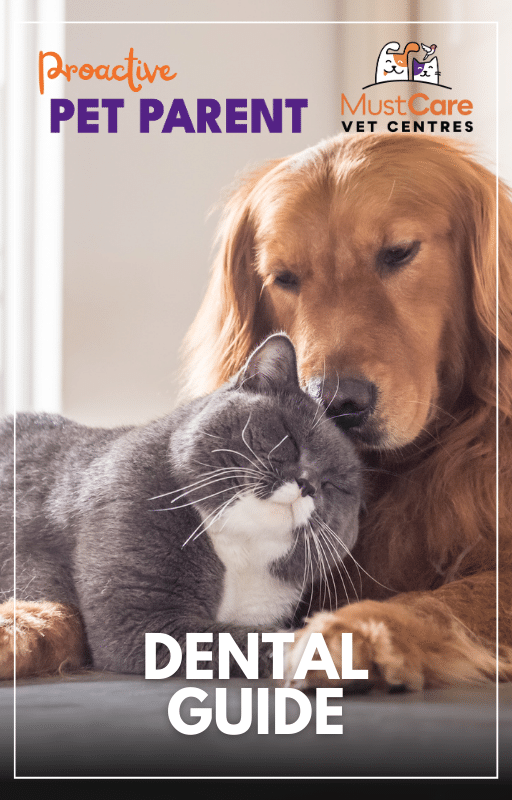Share This Blog With Other Pet Parents!
Protecting Your Pet: Understanding Vaccinations
In the world of responsible pet ownership, few actions are as critical as ensuring your furry companions receive proper vaccinations. These tiny injections wield immense power, serving as shields against potentially life-threatening diseases.
In this article, we delve deep into the significance of pet vaccinations, uncovering their undeniable importance in maintaining the health and safety of our furry companions.
What you’ll learn from this blog:

For all you need to know, download our
FREE Dental Guide
This blog is part of our Proactive Pet Parent series! This is just the beginning… To see more blogs, click here! Better yet, sign-up to our newsletter to receive these directly to your inbox each month.
Sign-up To The Proactive Pet Parent Newsletter
Understanding Pet Vaccinations
Pet vaccines are like tiny shields, fortifying your furry companions against a host of potentially devastating diseases. But how do they work?
Essentially, vaccines contain weakened or inactive strains of disease-causing agents. When administered to your pets, these vaccines trigger their immune systems to produce antibodies, which are proteins that fight off specific diseases. This means that if your pet ever comes into contact with the actual disease, their immune system will recognize it and swiftly mount a defence, preventing infection or reducing its severity. But not all vaccines are created equal. Different vaccines protect against different diseases, and some may require boosters to maintain their efficacy over time.
Understanding which vaccines your pets need and when they need them can be overwhelming, but it’s a crucial aspect of responsible pet ownership.
Benefits of Pet Vaccinations
The benefits of pet vaccinations extend far beyond simply preventing diseases; they provide peace of mind and contribute to the overall well-being of our furry friends. Examples include:
- Shielding pets from contagious and potentially life-threatening illnesses, vaccinations help them lead longer, healthier lives.
- Additionally, preventing these diseases through vaccination saves pet owners from the emotional distress and financial burden associated with treating sick pets.
- Vaccinated pets are less likely to require expensive medical treatments or hospitalisations, saving both time and money.
- Vaccinations play a crucial role in protecting not only individual pets but also entire communities of animals. By reducing the spread of contagious diseases, vaccinations help maintain herd immunity, ensuring the safety of even unvaccinated pets. This collective immunity is particularly important for vulnerable animals, such as young puppies or kittens and elderly pets, who may be more susceptible to severe illness.
Ultimately, the benefits of pet vaccinations are manifold, encompassing not only the health and happiness of individual pets but also the broader welfare of our animal companions as a whole.
Pet Vaccination Recommendations
When it comes to safeguarding your pet’s health through vaccination, it’s essential to follow the recommendations provided by veterinary professionals. Vaccination protocols vary depending on factors such as species, breed, age, lifestyle, and geographic location.
As a general guideline, core vaccines, which protect against common and potentially life-threatening diseases, are recommended for all pets. These typically include vaccines against rabies, distemper, parvovirus, and adenovirus.
Additionally, non-core vaccines may be recommended based on individual risk factors, such as exposure to specific pathogens or lifestyle choices. For example, pets that spend time in boarding facilities, dog parks, or areas with a high prevalence of certain diseases may benefit from additional vaccines.
It’s crucial to consult with your veterinarian to develop a tailored vaccination plan that addresses your pet’s unique needs and circumstances. By staying up-to-date on vaccinations and following your veterinarian’s recommendations, you can help protect your pet from preventable diseases and ensure their long-term health and well-being.
Importance of Vaccine Safety
Ensuring the safety of pet vaccines is paramount to maintaining trust in their efficacy and protecting the health of our animal companions. Factors to consider include:
- While vaccines are designed to stimulate the immune system and prevent diseases, there are rare instances where adverse reactions may occur.
- Understanding the importance of vaccine safety involves acknowledging these potential risks while also recognising the overwhelming benefits that vaccinations offer.
- Pet owners may understandably have concerns about the safety of vaccines, particularly regarding adverse reactions or potential side effects. However, it’s essential to remember that the vast majority of pets tolerate vaccinations well and experience no adverse effects.
- Veterinary professionals play a crucial role in addressing these concerns by educating pet owners about the safety and efficacy of vaccines.
- By providing accurate information and addressing any misconceptions, veterinarians help instil confidence in pet owners and encourage them to prioritise their pets’ health through vaccination.
- Additionally, ongoing research and monitoring ensure that pet vaccines undergo rigorous testing for safety and effectiveness before being approved for use.
Collaborative efforts between veterinarians, pet owners, and vaccine manufacturers help uphold the highest standards of vaccine safety, ultimately safeguarding the health and well-being of our beloved pets.
Vaccine Myths Debunked
In the realm of pet vaccinations, misinformation and myths abound, leading to confusion and apprehension among pet owners. Common myths include:
- That vaccines can cause autism in pets, mirroring similar misconceptions in human medicine. However, extensive research has debunked this claim, with no scientific evidence supporting a link between vaccines and autism in animals.
- Another common myth revolves around the belief that natural immunity is superior to vaccine-induced immunity. While natural exposure to a disease may confer immunity, it often comes at a significant risk to the pet’s health and may result in severe illness or even death.Vaccines offer a safer alternative by stimulating the immune system without exposing pets to the full strength of the disease.
- Additionally, some pet owners express concerns about over-vaccination, fearing that administering vaccines too frequently may harm their pets. However, veterinary guidelines recommend tailored vaccination schedules based on factors such as age, lifestyle, and risk of exposure to specific diseases, ensuring that pets receive adequate protection without unnecessary vaccination.
By debunking these myths and providing accurate information, veterinary professionals empower pet owners to make informed decisions about their pets’ health and well-being.
Ensuring Pet Health and Safety
In addition to vaccinations, several other measures contribute to maintaining your pet’s health and safety.
- Regular veterinary check-ups are crucial for early detection of any potential health issues and for ensuring your pet’s overall well-being.
- Your veterinarian can also provide guidance on nutrition, parasite prevention, dental care, and behaviour management. Providing a balanced diet tailored to your pet’s age, breed, and activity level is essential for their optimal health.
- Keep your pet protected from parasites such as fleas, ticks, and intestinal worms by following your veterinarian’s recommendations for preventative medications.
- Dental health is often overlooked but plays a significant role in your pet’s overall health. Regular tooth brushing and dental check-ups can prevent dental disease and related complications.
- Addressing behavioural issues promptly and appropriately is essential for your pet’s safety and the well-being of your household.
By implementing these measures and staying proactive in your pet’s care, you can help ensure they lead a happy, healthy life.
Understanding the importance of pet vaccinations and vaccine safety is paramount for every pet owner. Vaccinations protect our furry companions from a myriad of potentially deadly diseases, ensuring their health and longevity. By debunking common myths surrounding vaccines and adhering to recommended vaccination schedules, we can safeguard our pets and contribute to the overall well-being of our communities.
As always we’re here to help, don’t hesitate to contact us at MustCare Vets.

